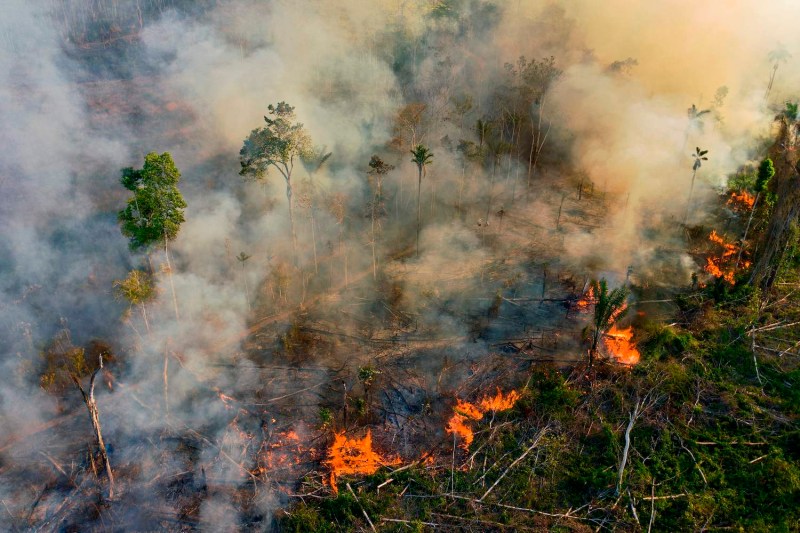In 2023, the shift in environmental politics seen in Brazil will be President Lula's main trump card at COP28, held in Dubai, in the United Arab Emirates (UAE), which began on Thursday (30).

In 2023, the shift in environmental politics seen in Brazil will be President Lula's main trump card at COP28, held in Dubai, in the United Arab Emirates (UAE), which began on Thursday (30). In its 28th edition, the United Nations Conference on Climate Change is the most important event of its kind.
In Dubai, 138 rich, poor and developing countries discuss goals and agreements to save the planet from global warming, which increased recent extreme events in Brazil, such as the drought in the Amazon and heatwaves in the Southeast and Mid-West regions.
After four years of Jair Bolsonaro's government - a term known for uncontrolled deforestation and setbacks in climate policies - Brazilian diplomacy is back to the global meeting. The country now has a sense of accomplishment and the ambition of paving the way to efficient solutions that may be agreed upon in 2025, during COP30, to be held in the city of Belém, in Pará state.
The deforestation rate, the number one cause of greenhouse gas emissions in Brazil, fell almost by half in the Amazon rainforest in 2023 and reached pre-Bolsonaro levels. The decrease enables Lula to lead the group of countries with tropical forests, including Congo and Indonesia.
Experts interviewed by Brasil de Fato say Brazil is again on the right track to tackle global warming. However, they also identified failures in the country's climate policies that have to be addressed.
Some of these gaps include the lack of planning to reduce methane gas emissions from animal raising and the inexistence of a schedule to diminish fossil fuel production and use.
The COP's effectiveness may bump into the low participation of civil society, a characteristic of the UAE, a federation of oil-rich monarchies where there are no direct elections, let alone a tradition of people's mobilization.
Keeping an eye on COP30
Formed by over 2,400 people, the Brazilian delegation to COP28 is the largest in the country's history to attend the event. With Lula heading it, the team includes ministers and other governmental representatives, besides businesspeople, intellectuals and environmentalists.
The main task of governments at COP28 will be to approve the Global Stocktake of the Paris Agreement, a process that takes place every five years with the aim of evaluating the effectiveness of the response to the climate crisis negotiated in 2015 during COP21, held in the French capital.
As seen in almost all the COPs, the most complicated discussion in Dubai will be the demand presented by developing countries for climate financing and decreasing fossil fuel consumption, particularly oil, a basic condition to lay the ground for the next COPs.
"The major expectation of COP29 is to define a new level for financing climate action. After that, at COP30, countries are expected to present their new NDCs [Nationally Determined Contribution, which is the reduction target defined by countries themselves]", said André Corrêa do Lago, Secretary of Climate, Energy and Environment at the Ministry of Foreign Affairs.
Low popular participation and conflict of interest
Carlos Bocuhy, from the Proam Institute, sees people's pressure as fundamental to convince countries to sign more ambitious climate agreements. Undemocratic COP host countries, such as the UAE, make difficult the occurrence of protests by activists and people directly affected by climate change.
"There won't be the voice of the streets that encourages climate conferences. And there is another issue that must be carefully discussed: the conflict of interests installed particularly in the current conference being held in the UAE, since this country is known as a huge oil company", Bocuhy warns.
According to BBC based on leaked documents, the UAE plans to take advantage of being the host country to close oil and gas trade deals, including with Brazil. These are conflicting interests for a host country, which usually has great power in setting the agenda and defining agreements.
"Besides, the consultancy company organizing the conference is specialized in promoting plans for multinational oil companies. It is disdaining the plan to be proposed by the UAE government at the conference, which is to extend oil use until 2050, with no prospect of eliminating it, only reducing its use", criticized Bocuhy.
Brazil leads by example, but cattle raising blemishes its image
By accomplishing its duties to reduce deforestation, Brazil may lead by example. However, the country still fails by contradictorily being the world's ninth biggest oil producer, breaking records in the last months.
"This year, Brazil not only outstands by its capacity to curb deforestation, but also for being lucky, because it rained. There was a higher hydroelectric generation capacity. Therefore, in this sense, Brazil has advanced a lot. I believe we can drive Brazil, once again, to a leading role in the COP, but cattle raising keeps being a bad thing," says Carlos Bocuhy.
Marta Salomão, from the Talanoa Institute, emphasizes that the main Brazilian sector in greenhouse gas emissions is livestock farming, an activity dominated by agribusiness and responsible for populating the atmosphere with methane, one of the most prejudicial inducers of global warming.
"Brazil is the sixth emitter of greenhouse gases. In the next months, we hope that some measures will be taken by the Ministry of Agriculture, allowing the implementation of an agreement – already signed by Brazil – to reduce methane emissions by 30% by 2030", stated the researcher.
"In agriculture, the Brazilian government has the ABC Plan [Low Carbon Agriculture, in English], which aims to reduce one gigaton (one billion tons) of greenhouse gases in ten years. However, the metrics to monitor the implementation of this plan are still fragile," added Marta Salomão.